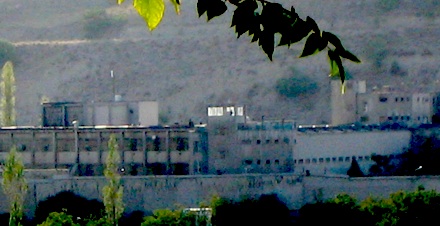The Iranian universities have historically been the sight of the fiercest battles between the successive dictatorships (of the last one hundred years) and the people represented by the students. This is exactly why the regime, throughout its life, has actively tried to pacify the campuses. To no avail! The next historical stage of the Iranian student movement will be a significant one.
The University: Green Politics and Deep Politics?
By Amir K.
Khiaban #48 / Wednesday, September 23, 2009
The university has never been a warm and comfy house of learning. At least not in Iran. Here, it has been a long alleyway shaped by various struggles and fights paving its path; a compact arena of struggle between despotism and freedom, between dictatorship and self-management/autonomy, between the science of oppression and control on the one hand, and the science of liberation on the other; the main artery of the contemporary political history of Iran.
The Islamic Republic was strengthened by its conquest of the universities. I do not mean merely the shutting down of the universities in 1980 and the violent elimination of the vanguards of the student movement in Iran, which in itself was a seminal arena, and the courageous resistance of students -- who fought back when confronted with Khomeini's religious fascism and lost their lives, and did not silently surrender to the cultural counter-revolution of the Islamic Republic -- will shine in the history of the [Iranian] university. But also, declaring Tehran University to be the location of the Tehran's Friday prayers clearly highlighted the relationship between the university and the current regime. The spatial conquest of the university perhaps was primary to the conquest of the social discourse and the military-political coup of 1981 and the [total] closing of the social public space. [The process of] Islamizing of the university was an important part of putting shackles on the society by the new power bloc, which had just begun battering the body of the revolution.
The rapid consolidation of the ruling regime within the life of Tehran University was the response given by Khomeini and his murdering cohorts to freedom, diversity and the collective splendor that the 1978 revolution had spread across the green grass of Tehran University. Taking the Friday prayers into the university apace was done to guarantee the [continued] control of the university space by reactionary religious forces. [...] The goal of the Shiite clerics was to impose their own system of thought on the modern structures of the university. The weekly presence of numerous believers in Islam in a space which is [supposed to be] the main vessel of critical thinking, and the weekly sermons of the religious functionaries of the regime for the purpose of disseminating their thoughts and ideas, instead of disseminating concepts and ideas by academic and progressive forces, was a giant step by the regime in burying the revolution.
Now and once again, the university has been turned into the heart of the society. People who, on September 18, raised the slogan, "When the university opens,
Iran will see Armageddon!" (Daaneshgaah ke baaz besheh, Iran qhiyaamat misheh!), understand well the importance of fighting in the universities. The university is that nerve center that, with its [youthful] enthusiasm and idealism, can blunt and nullify those mercantilist type of calculations of a dictatorship-ridden society. It is also a nerve center that can prevent deviation and cooptation of the people's movement, and be the center for providing consciousness and alertness as well as defense of the interests of those whose voices have been expropriated, who have no spokespeople, and the oppressed. The dictatorship too, with its trembling, shows us the importance of this fight. The organized assault against the student activists, the absolute militarization of the university, widespread expulsions and the habitual Islamizing of the university are the regime's strategies for defeating the people in the university trenches.
The battle in the university is one of appropriating that space as one's own. By determining the subjects, by [implementing particular policies for] student admissions, by enforcement of [gender] apartheid, appointment of instructors from their own ranks, dragging their own ceremonies into the university space, expulsions, and imposition of dispersion and spreading of waves of reaction, the regime tries to achieve its goals. But, the students too, just like the ordinary people at the beginning of their new revolution, have realized that in order to defeat the enemy they must capture the university spaces. They do not fear, for they are all together. They have the power to cut off the hands of the rulers from their educational and living spaces.
The university, up to now, has been a collection of classes, spaces, doors and gates, corridors and books as well as cold and regime-afflicted discussions that the students merely passed through; a collection brimming with student populations, who are nonetheless captives of the rulers. A victory for the movement, however, means taking back this space from the regime. Victory does not mean huge gatherings in defense of this or that political leader, a gathering, at the end of which everybody goes back to their previous situations and only some photos of flags and placards will remain of it in some media. Overcoming dictatorship means the creation of free and social spaces. Without such creations, and without taking back the university from the dictatorship, only an illusion of victory will remain in place.
Green politics or deep politics?
The higher education institutions in Iran bring together within them millions of students and tens of thousands of educators. If we add to that number the staff and workers employed in these institutions, it can be observed that compared to this large population, even thousands of thugs, Basiji's and killers of the regime are insignificant. The Islamic Republic can maintain its occupation of the university only on the condition of the indifference of a majority; just as it had an absolute occupation established on the streets only until the collective street movement of the people. Today, however, nobody in the university is indifferent. And this is exactly our point of departure:
Green politics, in recent days has been focused on showcasing general dissatisfaction regarding the coup. This policy tries to challenge the legitimacy of the current government and to legitimize its own political alternative. Visualization of its sign as the color green, slogan writing its swift tactics, and organizing green sit-ins and gatherings are the ultimate tactics in its arsenal. This form of politics is still confused because the reformist leaders are as of yet incapable of formulating their larger goals and strategies. In this type of politics, the students keep doing busywork while they wait for further commands from the leadership headquarters.
In deep politics, however, the main strategy is to take the university back from the ruling regime and to re-appropriate it. Women students who, in their dormitories and university surroundings, are subjected to discrimination, ridicule or repression, can challenge the baseless power of the religious interference and university administration with their collective organization; students can themselves determine the criteria regulating what to wear, how to behave, how to interact, etc. Their collective solidarity is their real power for taking back those spaces that in principle belong to them. In defending their right to engage in student-related and political activities, a majority of students organize themselves and break the blade of fear and oppression. They will voice their opinion about what to read and resist the imposition by the clergy of reactionary subjects on the university. They take control of their dormitory spaces into their own hands and defend their living environment against the fascists. They organize free seminars, extra-curricular classes, study groups, they organize their own gatherings and [political] actions and determine their contents and defend them. With such a strategy, with every step taken backward by the dictatorship, a free and democratic space is created which in turn prevents the return of the dictators. The commitment or the treachery of political leaders will become clear with their commitment to, or treachery against, these collective efforts of the students.
Such an effort will provide the foundation for a nationwide federation or organization of the country's students. An organization that is open to all, and different groups are active within it while maintaining their positions, as factions, an organization that includes all students, and for this very reason will turn into the organized power of the students in the fight to push back dictatorship and to achieve freedom.







